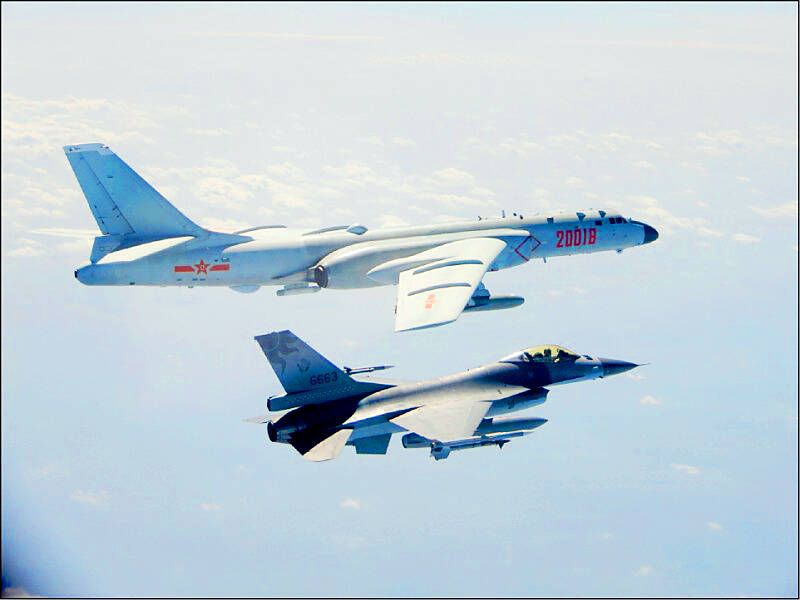A relatively large number of Chinese military aircraft and vessels were detected in Taiwan’s vicinity yesterday morning, apparently en route to a Chinese military exercise in the western Pacific, the Ministry of National Defense (MND) said.
In a statement, the ministry said 36 Chinese People’s Liberation Army (PLA) aircraft, including J-16 fighters and nuclear-capable H-6 bombers, crossed the median line of the Taiwan Strait or an extension of it, and were detected in the southern and southeastern parts of Taiwan’s air defense identification zone (ADIZ) from 5:20am to 9:30am yesterday.
They were headed toward the western Pacific to take part in a joint air and sea military exercise there alongside the Chinese aircraft carrier Shandong, the ministry said.

Photo courtesy of the Ministry of National Defense
Speaking to reporters at the Legislative Yuan shortly before his ministry announced details of the latest mission by the Shandong, commissioned by China in 2019, Minister of National Defense Wellington Koo (顧立雄) said the ministry had a “full grasp” of the ship’s movements.
“It did not pass through the Bashi Channel,” he said, referring to the waterway that separates Taiwan from the Philippines and is the usual route Chinese warships and warplanes take when they head into the Pacific.
“It went further south, through the Balintang Channel, to the western Pacific,” Koo said.
Balintang Channel is about 250km south of Bashi.
The Chinese Ministry of National Defense did not immediately respond to a request for comment.
The Philippine military said it was concerned with the deployment of the Chinese carrier group.
“We emphasize the importance of maintaining peace and stability in the region and urge all parties to adhere to international laws and norms,” Philippine military spokeswoman Colonel Francel Margareth Padilla said.
The Philippines is involved in a standoff with China over the disputed Second Thomas Shoal (Renai Shoal, 仁愛暗沙) in the South China Sea.
Late on Tuesday, the Japan Self-Defense Forces said they detected the Shandong along with an escort of two missile destroyers and a frigate about 500km south of Okinawa islands.
Two Japanese navy ships were observing their movements while Japanese fighter jets scrambled in response to aircraft launched by the carrier, it said in a statement.
Taiwan has previously reported the Shandong operating near the nation, including in December last year, when it passed through the Taiwan Strait just weeks ahead of the Jan. 13 elections.
China has never renounced the use of force to bring Taiwan under its control and has ramped up military and political pressures on the nation over the past few years.
Taiwan is to hold the annual Han Kuang war games starting on July 22, and China has stepped up its own activities.
Since the start of this month, Taiwan has reported detecting more than 270 Chinese military aircraft operating around it, as well as two Chinese “joint combat readiness patrols” with warplanes and warships.
One security source, who is familiar with Chinese deployments in the region, said China traditionally carries out drills in summer due to good weather, but there is an “unusual” uptick in its recent movements.
“The security situation around Taiwan is worrying,” the source added, speaking on condition of anonymity as they were not authorized to comment publicly.

Chinese Nationalist Party (KMT) Chairman Eric Chu (朱立倫), spokeswoman Yang Chih-yu (楊智伃) and Legislator Hsieh Lung-chieh (謝龍介) would be summoned by police for questioning for leading an illegal assembly on Thursday evening last week, Minister of the Interior Liu Shyh-fang (劉世芳) said today. The three KMT officials led an assembly outside the Taipei City Prosecutors’ Office, a restricted area where public assembly is not allowed, protesting the questioning of several KMT staff and searches of KMT headquarters and offices in a recall petition forgery case. Chu, Yang and Hsieh are all suspected of contravening the Assembly and Parade Act (集會遊行法) by holding

PRAISE: Japanese visitor Takashi Kubota said the Taiwanese temple architecture images showcased in the AI Art Gallery were the most impressive displays he saw Taiwan does not have an official pavilion at the World Expo in Osaka, Japan, because of its diplomatic predicament, but the government-backed Tech World pavilion is drawing interest with its unique recreations of works by Taiwanese artists. The pavilion features an artificial intelligence (AI)-based art gallery showcasing works of famous Taiwanese artists from the Japanese colonial period using innovative technologies. Among its main simulated displays are Eastern gouache paintings by Chen Chin (陳進), Lin Yu-shan (林玉山) and Kuo Hsueh-hu (郭雪湖), who were the three young Taiwanese painters selected for the East Asian Painting exhibition in 1927. Gouache is a water-based

Taiwan would welcome the return of Honduras as a diplomatic ally if its next president decides to make such a move, Minister of Foreign Affairs Lin Chia-lung (林佳龍) said yesterday. “Of course, we would welcome Honduras if they want to restore diplomatic ties with Taiwan after their elections,” Lin said at a meeting of the legislature’s Foreign Affairs and National Defense Committee, when asked to comment on statements made by two of the three Honduran presidential candidates during the presidential campaign in the Central American country. Taiwan is paying close attention to the region as a whole in the wake of a

OFF-TARGET: More than 30,000 participants were expected to take part in the Games next month, but only 6,550 foreign and 19,400 Taiwanese athletes have registered Taipei city councilors yesterday blasted the organizers of next month’s World Masters Games over sudden timetable and venue changes, which they said have caused thousands of participants to back out of the international sporting event, among other organizational issues. They also cited visa delays and political interference by China as reasons many foreign athletes are requesting refunds for the event, to be held from May 17 to 30. Jointly organized by the Taipei and New Taipei City governments, the games have been rocked by numerous controversies since preparations began in 2020. Taipei City Councilor Lin Yen-feng (林延鳳) said yesterday that new measures by